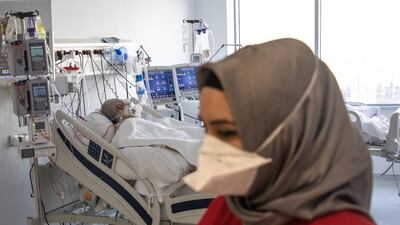Turkey’s president has come under fire after his office revealed that his aides are tested daily for coronavirus, prompting claims of a two-tier approach to combating the pandemic.
President Recep Tayyip Erdogan’s spokesman Ibrahim Kalin this week said in a TV interview that Turkey was demonstrating “how to protect a leader” when he revealed those coming into contact with the president received coronavirus testing every day.
Coming after the diagnosis of US President Donald Trump and other world leaders including UK Prime Minister Boris Johnson and Brazilian President Jair Bolsonaro, Mr Kalin’s remarks angered Turkish medical groups who have complained of insufficient testing and protection for health workers during the pandemic.
Mr Kalin also revealed Mr Erdogan had been isolated at the presidential mansion in Istanbul for 70 days during the outbreak and said the president received regular testing himself.
“Our president was very well protected there,” Mr Kalin said. “We didn't go out, we didn't get guests from outside with a very rare exception or two.”
Since the first coronavirus case was detected in Turkey in mid-March, health workers have protested against a lack of testing, personal protection equipment as well as a punishing workload due to busy coronavirus wards.
Last month, opposition MP Gamze Akkus Ilgezdi revealed that 800 medical staff have resigned during the pandemic.
Gonul Erden, co-chair of the Health and Social Service Workers’ Union, said 110 staff had died from Covid-19 and at least 40,000 had been infected.
“This is the responsibility of the power that tests itself every day but does not test health workers,” she said, referring to checks on Mr Erdogan’s staff.
Zekiye Bacaksiz, president of the General Health-Work Union, called for a minimum of weekly testing for health staff.
“But when we suggested that, [the government] said ‘You can’t do it’,” she said. “We see that everything is for them. They are keeping up all kinds of luxury and pomp. They don’t even have an egalitarian testing policy.
“This is a situation that shows that the AKP government always prioritises itself and looks out for its own interests.”
Mr Kalin’s comments added to the perception that those close to the government have benefited from preferential treatment in the approach to tackling coronavirus.
Paramedics in the capital Ankara told the opposition BirGun newspaper last month that they were directed to give priority to "VIP patients" over more serious coronavirus cases. These VIPs were often politically-connected people or those with ties to Health Ministry officials.
“They’ll directly say ‘This is a VIP patient’ and redirect us even if we’re going to another house,” one ambulance worker told the newspaper, adding that even asymptomatic “VIPs” were given priority over other cases.
There are also claims that restrictions to prevent the spread of coronavirus are not applied evenly.
Days after a government decree imposing limits on wedding parties, images emerged of the marriage of a ruling party MP’s son where attendees flouted the rules on the number of guests, serving food, social distancing and wearing masks.
Turkey has recorded more than 9,000 deaths since the start of the pandemic and a total of 340,450 patients as of Wednesday evening. However, last week Health Minister Fahrettin Koca admitted that the number of patients did not include asymptomatic cases as required by the World Health Organisation.
Nearly 12 million tests have been carried out.
Medics’ representatives, who have consistently questioned the government’s approach to the pandemic and the veracity of its data, have come under increasing pressure in recent weeks.
On Wednesday, Mr Erdogan described the newly elected head of the Turkish Medical Association as a “terrorist”, a reference to her conviction two years ago for signing a letter calling for peace in Turkey’s majority-Kurdish southeast.



















